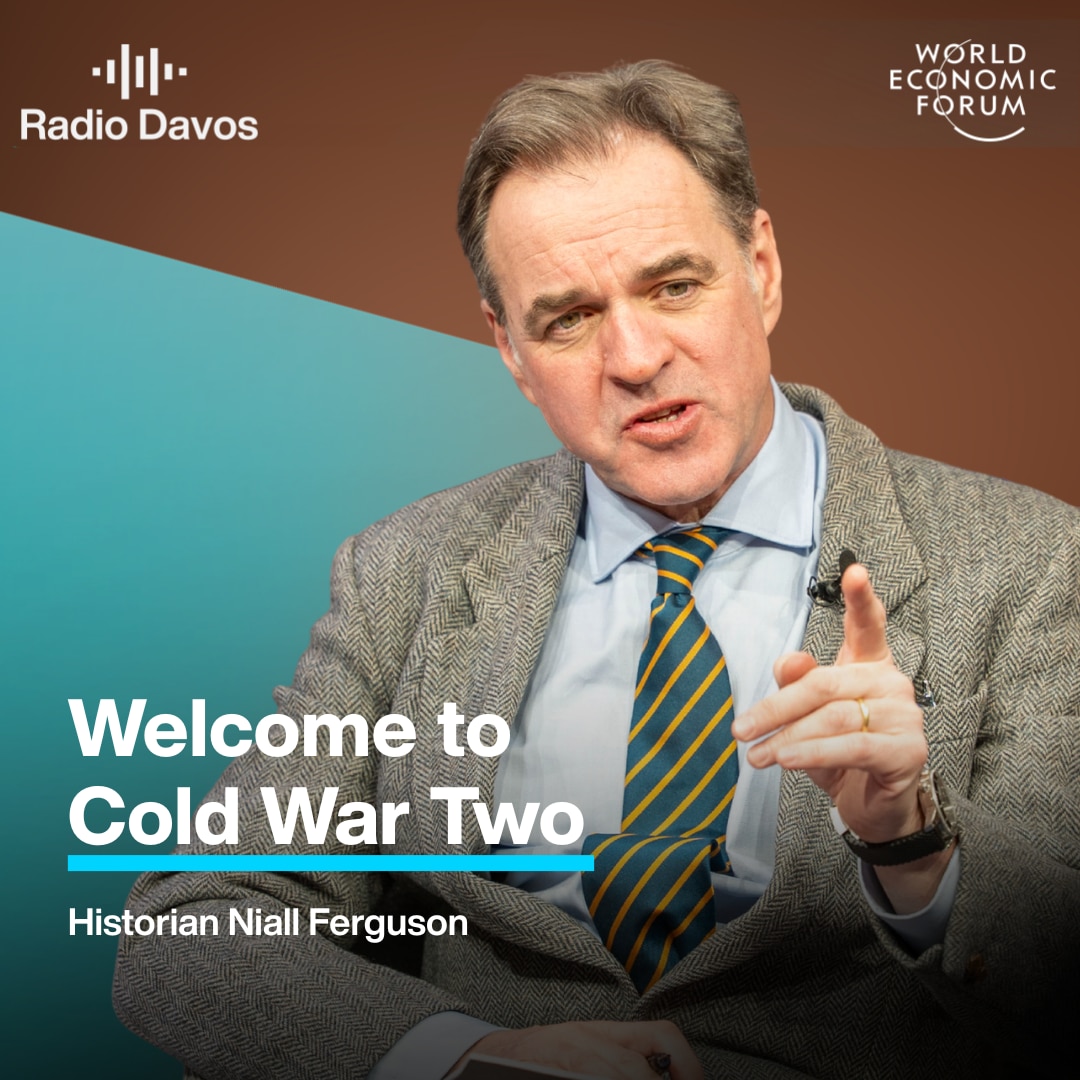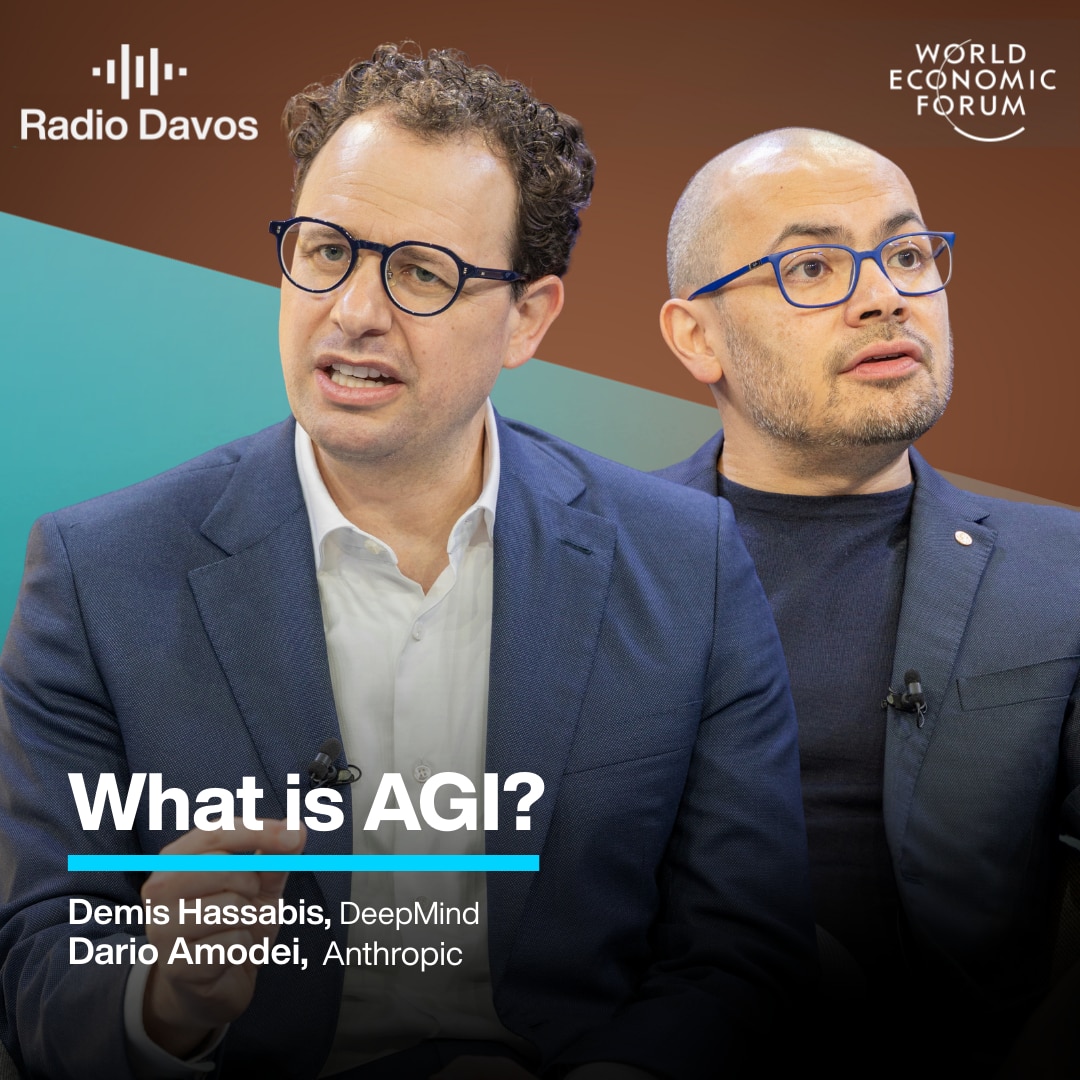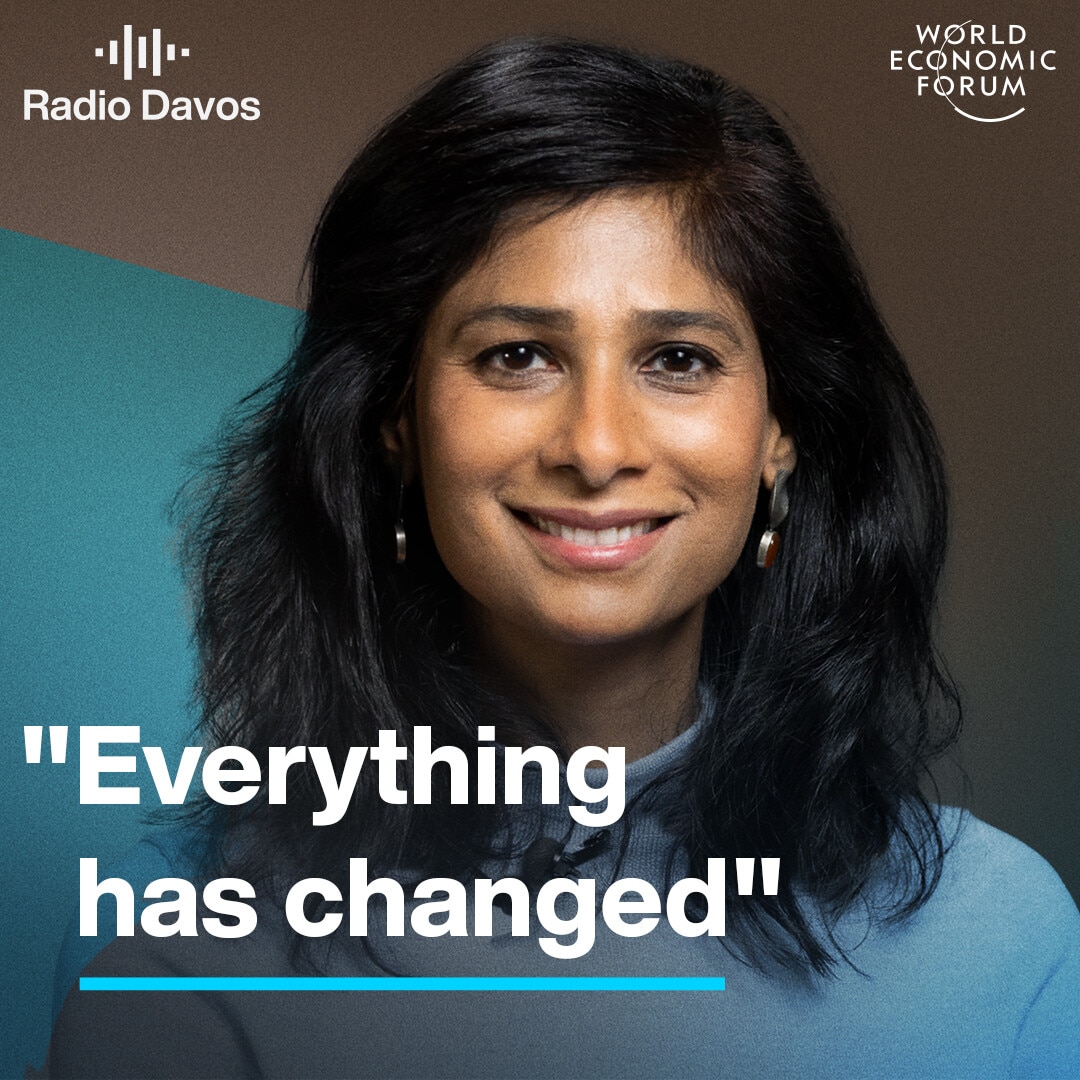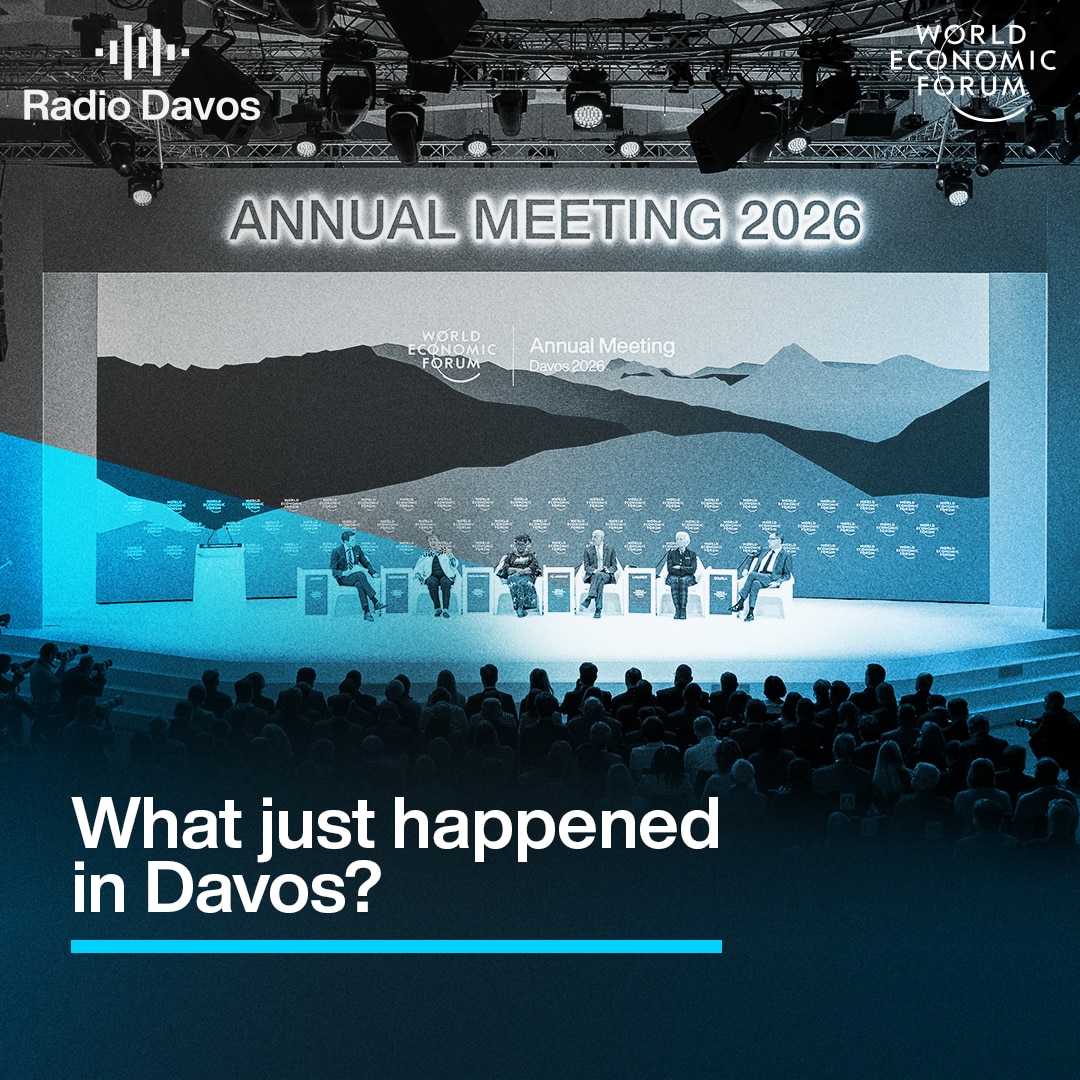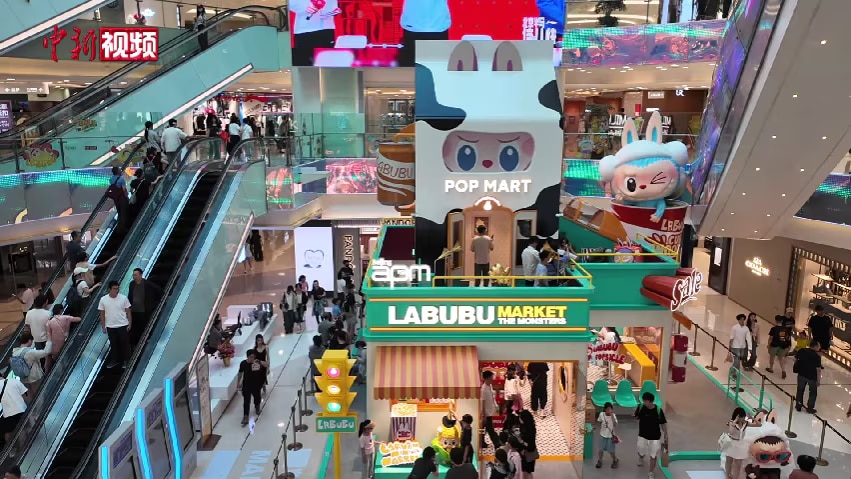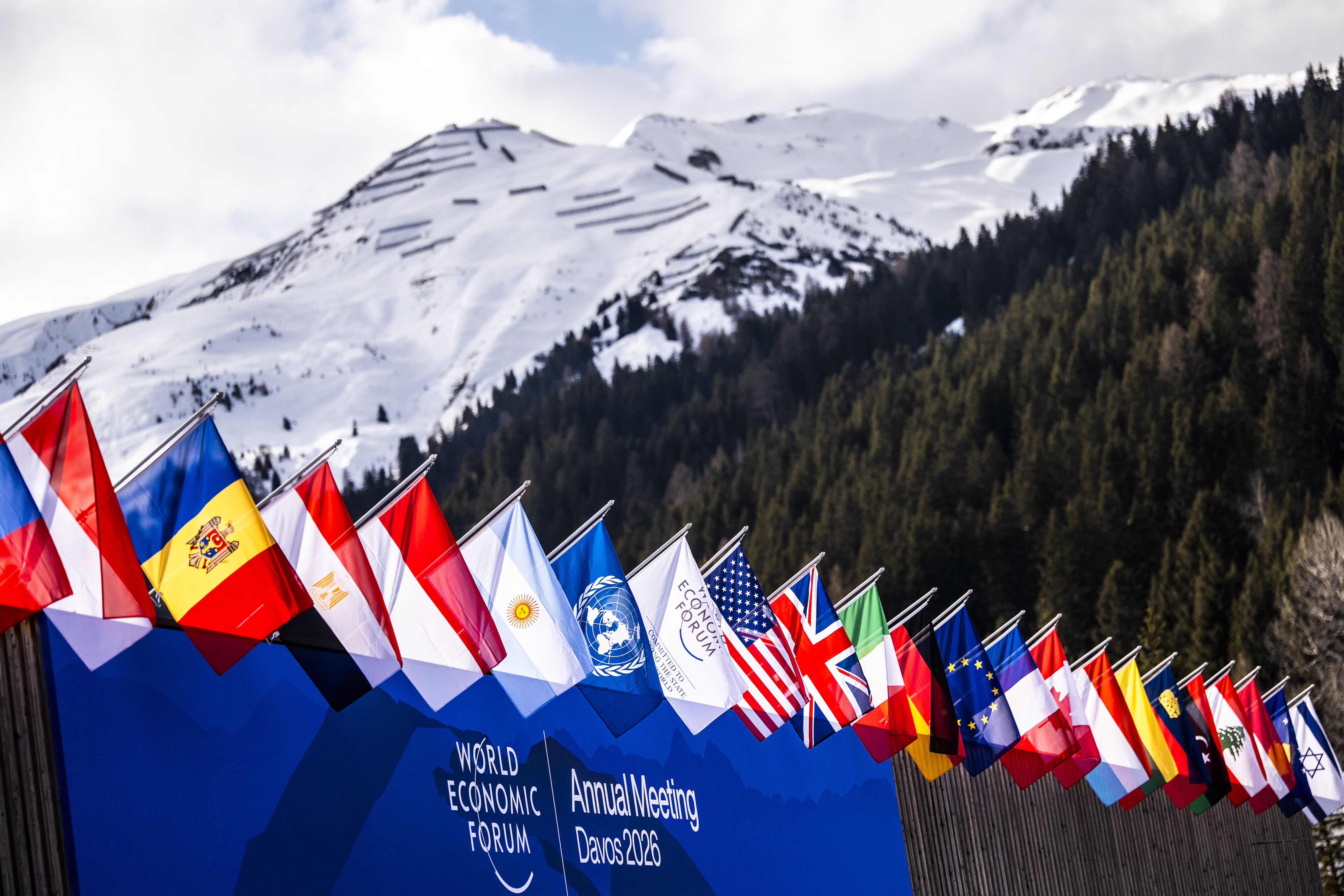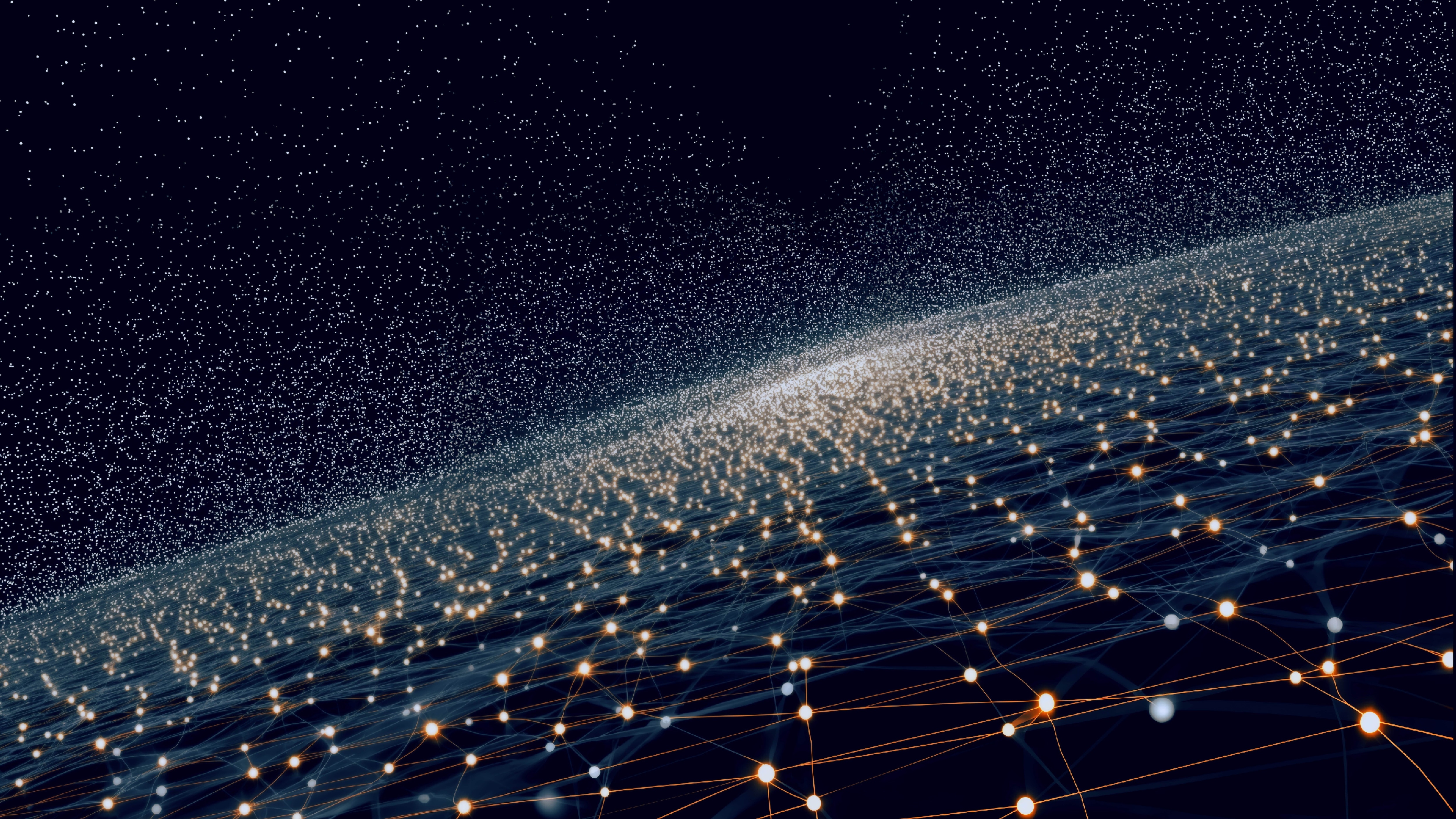TradeTech: the trillion dollar promise that could unlock smoother global trade
播客文字稿
This transcript has been generated using speech recognition software and may contain errors. Please check its accuracy against the audio.
Vincent Clerc, CEO, A.P. Moller-Maersk: Today, there are more barriers to trade on the data and technology side that there is on the physical.
Robin Pomeroy, host, Radio Davos: Welcome to Radio Davos, the podcast from the World Economic Forum that looks at the biggest challenges and how we might solve them. This week, trade
Thani Ahmed Al Zeyoudi, Minister of State for Foreign Trade, United Arab Emirates: As the UAE, we are going to be hosting the World Trade Organisation ministerial meeting, aiming to bring back trust among the member states, bringing back the multilateral discussion and bringing back the strength of the WTO.
Robin Pomeroy: The head of the World Trade Organisation says what she expects from this meeting of the topmost body of the WTO, something that only happens once every two years.
Ngozi Okonjo-Iweala, Director-General, World Trade Organization: I'm very hopeful for a successful ministerial conference. It will not be easy in these uncertain times. But we're looking forward to deliveries that will strengthen the WTO and the multilateral trading system.
Robin Pomeroy: And we look at the potential that technology has to make trade smoother and more efficient.
Vincent Clerc: Global trade is enormous and keeps the world spinning, but the global supply chain is still extremely fragmented.
Robin Pomeroy: We hear from that head of one of the world’s biggest shipping lines, and from the person who will chair the WTO ministerial - talking about the potential of ‘trade tech’.
Thani Ahmed Al Zeyoudi: Technologies and innovations that will enable the global trade to be more efficient, inclusive.
Robin Pomeroy: Subscribe to Radio Davos wherever you get your podcasts, or visit wef.ch/podcasts where you will also find our sister prgrommes, Meet the Leader - weekly insights from some of the most interesting and influential people, and Agenda Dialogues - the full audio from World Economic Forum events, including the Annual Meeting in Davos.
I’m Robin Pomeroy at the World Economic Forum, and with this look at global trade and trade tech on the eve of the WTO ministerial...
Ngozi Okonjo-Iweala: See you in Abu Dhabi.
Robin Pomeroy: This is Radio Davos.
It's called the 'Trillion-Dollar Promise', the idea that technologies such as blockchain, artificial intelligence, 3D printing, and the Internet of Things could help smooth trade could unlock a fortune in costs saved and trades boosted.
In this episode we will hear from the trade minister of the United Arab Emirates which has partnered with the World Economic Forum in the TradeTech initiative, which aims to make this a reality.
We will also hear from the CEO of A.P. Møller-Maersk, one of the world's biggest shipping lines, to get his opinion om technology and trade.
The UAE minister, Thani Ahmed Al Zeyoudi, will be hosting a TradeTech Forum on 27 February, on the sidelines of the World Trade Organisation's 13th Ministerial Conference in Abu Dhabi from 26 to 29 February 2024. That conference - known as an MC - is actually the WTO's top decision-making body.
So it's an important event for the first speaker you'll hear in this episode, WTO chief Ngozi Okonjo-Iweala. She was speaking a few weeks ago in Davos, and this is what she had to say about the Ministerial Conference.
Ngozi Okonjo-Iweala: Let me say that we are working very hard, with the strong partnership of His Excellency Minister Zeyoudi, who is chairing the chair of the MC13, on making the preparations. As we speak, we have ambassadors negotiating day and night in Geneva in order to be able to deliver some of the issues that we are working on.
So we are hoping to see progress on sustainability issues, on fisheries. We're negotiating a second phase of the fisheries subsidies agreement, and we hope we'll be able to, that that is something we can, hopefully, ministers can come to some conclusion on.
We are working on development issues. There are some specific requests that developing countries have of measures within some of our existing trade agreements. They think that if they could be modified, would help them develop their economies better and have more policy space. We are working on those.
We are working on WTO reform, reform of the dispute settlement system in particular, which, you know, is very important to us and we believe we need as part of a modern WTO going forward. We hope to see some progress on that.
And agriculture. At the last MC it was the one area where we were not able to make as much progress. So hopefully we will agree on a basis. We will not be delivering an agriculture agreement, but can we come to a common understanding of the work that needs to be done?
Then I want to end, there's so many things, but we have an investment facilitation agreement which is very important. It's a pluralteral, 110 countries are involved in it, of which 80 are developing countries. And we hope to be able to wrap that up at MC13. If we do, I'll be very proud and happy, because it does do several things to make investment more attractive in our member countries who have negotiated this.
And we also hope to do some non inclusion. We are working on launching a fund for women, for $50 million to support women in digital, accelerating digital trade for women.
See you in Abu Dhabi. I wanted to to end with that. I'm very hopeful for a successful ministerial conference. It will not be easy in these uncertain times. But we're looking forward to deliveries that will strengthen the WTO and the multilateral trading system.
Robin Pomeroy: Ngozi Okonjo-Iweala, Director-General of the World Trade Organization, speaking at the World Economic Forum's Annual Meeting in Davos last month. Also there in Davos was Vincent Clerc, the CEO of the shipping line A.P. Moller - Maersk. In his session, please forgive some background noise, and let's hear what Vincent Clerc had to say about the potential of using more technology in trade.
Vincent Clerc: So if you look actually at what has happened over the last few decades, a lot of work has been done in removing trade barriers. And that created all that growth and all that growth in trade.
But this has not been matched by actually creating the same connectivity in the data world that is so important to underpin global trade, as it is in the movement of goods, the physical movement of goods.
So there we've done tremendous progress in opening up, signing trade agreements, developing infrastructure and being able to move the goods.
If you look at the data, it's still extremely fragmented for something as simple, I think you were talking about data standards, geolocation. There is not one way of determining geolocation which makes data interchange extremely complex. And it goes like this for virtually every data field that you're using in the course of global trade.
It makes the world of a lot of the actors in the ecosystem, whether it is the banking community to finance the trades, whether it is the exporters and importers that need to exchange data or use different vendors, makes it very difficult for them to connect those data.
Global trade is enormous and keeps the world spinning, but it is underpinned, the global supply chain is still extremely fragmented. And what this means is the data is siloed to an extent where it's very difficult to create sufficient network effects to really see this take ground and pace.
People are actually very jealous of their silo. They're afraid also of some of the cyber implications of sharing their data. Security implications, a lot of the things that were mentioned before, also on the competitiveness of data, is standing in the way.
And then you have that suboptimal outcome where that fragmentation is actually being jealously protected and has an incredible cost on the sum of of the parts.
Today, there are more barriers to trade on the data and technology side that there is on the physical side. And this affects, I think, this asymmetry that was being talked about, this affects certain emerging economies harder than it does other more developed economies.
And this inability that there has been so far to connect this and to create that infrastructure is actually a big issue. And it's, I can give you a simple example. There is about 200 countries in the world that all have customs authorities that need to look pretty much at the same thing where a shipment is either leaving the country or coming in the country. And yet there is no standard way of having data interfaces between the different customs agencies and the service providers. And what does that mean? It means a tremendous amount of lost time and cost where you can have physically fantastic terminal infrastructure, ships and railroads and railways. But the cargo gets stuck on a data connection between customs and the shipper, things go black for ten days before you can know about anything.
Robin Pomeroy: Vincent Clerc, CEO, A.P. Moller-Maersk - and it's well worth watching that whole session - available on our website, link in the show notes.
The host of next week's WTO ministerial and of the TradeTech Forum, both in Abu Dhabi, is Thani Ahmed Al Zeyoudi. He spoke to Radio Davos to explain what exactly is TradeTech and what needs to happen to make the trillion dollar promise a reality.
Thani Ahmed Al Zeyoudi: The TradeTech initiative is a partnership between the governments of UAE and the World Economic Forum, with the aim of accelerating the digitisation, as well as adopting the technology so we can ensure that the international trade is smooth, improved and moving forward.
So it's a set of technologies and innovations that will enable the global trade to be more efficient, inclusive, equitable. Here we're talking about very diverse technologies, when it comes to Internet of Things, artificial intelligence, blockchain, and any other technology which could have the potential to revolutionize the way the trade is done.
So it's going to impact many of the areas. We're talking about customs, finance, for sure, which is a key aspect of any trade, supply chain as well as the warehousing solutions.
The initiative will focus on many elements and it's going to be having an incubator. We are going to enable promising startups in this space with the capital resources to grow their ideas into a very, very friendly ecosystem. A Forum which is bringing the main players and movers as well as shakers in the sector. Reports which bring in the best practices and highlight the way forward and many of the challenges that are facing the globe. And for sure the sandbox where companies, startups, can experiment, try some of their innovations at the edge or outside the existing framework.
We in the UAE, we've been always acting as a sandbox. The trade has been always an integral part of our economic growth. We've been a leader of many of the global commodities movements. And we're going to be one of the main supporters for the innovators and tech providers in this sector as well.
Robin Pomeroy: People who want an introduction to what trade tech might be, could read your blog on the subject, which, you published on our website last year. I'm just going to cite a couple of things from it. You say, "We're on the cusp of a new dawn of tech driven trade transformation." So a lot of people who don't work in trade or think about trade that much might be surprised at how much technology could have an impact on trade. In your blog, it says simply digitalising bills of lading - the documents about cargo - could save $6.5 billion in direct costs globally. It's astonishing. Could you give us some examples of where it is having an impact, or could have an impact in the future?
Thani Ahmed Al Zeyoudi: Absolutely. Let's look at the process of the chain of movements of commodities from one place to another. It moves out from the manufacturing to the distribution warehouses in those countries, to the ports or the airports where it has to be cleared and gets ready to be transported globally. So it has to go through as well the customs, then the shipments companies, until the other ports point. And from there, sometimes those communities get stuck for a few days because of the process, the availability of resources. I'm talking about human resources here, and then the documentation availability etc, and then to the warehouses, to the consumer.
So if we go through the whole journey of those commodities, it is time consuming. It's a lot of intervening and intermediates in this process. And let's imagine if we can systemise those movements of commodities and how fast it's going to go from point A to point Z throughout those processes.
Pick up only in one chain of the whole thing, the customs. The minimum steps and or requirements in customs is 16 matters. So let's imagine if that is going to be automated. That's going to shorten a huge process within the customs. Let's imagine if we can digitalise as much as we can throughout this journey. That's a game changer for all the business people, to the traders as well as to the consumers to get their products and services at a speedy manner.
Robin Pomeroy: So the TradeTech initiative brings businesses and governments together. What can they do to progress with trade tech? And also related to that, why isn't it happening already? What are the things stopping this happen anyway? And why do you need to bring governments and businesses together in this way?
Thani Ahmed Al Zeyoudi: Well, the TradeTech initiative, for sure, will build a global ecosystem by bringing key stakeholders together. Here we're talking about industry leaders, technology providers, startups, tech, government officials until a very cohesive, I would say network. And the policymakers and government should create and implement the regulatory frameworks, ensure that the adoption of the technology to their own regulations and systems, and this regulations should be put in place to pave the way to further enhance and adopt those solutions as well things to move forward.
We as governments usually lay down the regulatory frameworks. The industry leaders as well have to step up and play their responsibility here to address the challenges that they face when adopting such technology to ensure the solution is really implementable.
So adoption of those technologies will provide the opportunities, and we have to ensure that there will be a trial so we can reach a level where it's acceptable by everyone.
Now, then we go to the other parties, which is the global investors and venture capitalists, where we have the significant opportunity investing in a trillions of dollars sector, where they can encourage more innovations and for more technology aspects to be adopted and be expanded and scale up the sector.
Then comes to the tech providers and the startups across the world. There's so many excellent best practices, excellent cases which we can adopt, which could be as well tailored to certain markets and certain countries.
Then we have to ensure as well throughout the process we have a sandbox where we can test those technologies, based on the regulations and the ecosystem, and ensure that it's going to be implementable in a scale that is going to be as well taken to a global level.
If you allow me, I want to give some examples here where countries work together on such system.
Hong Kong, their customs launched a pilot ID system where the cargo big data system applied big data analytics and artificial intelligence to cargo clearance. They did it based on a need which they saw. They adopted that concepts and moved on.
About the customs, the UAE as well is another example where they launched a very smart system where it does classify the different data and this system is powered by artificial intelligence and assists the users where they can get easily the HS codes and ensure that the clearance is straightforward when it comes to those services that they want to have access to.
Germany has another excellent example. In Port of Hamburg they use the blockchain to track the shipping and companies.
And those many examples around the world have been done in close coordination and network between governments. So we're not coming up with something new. We're ensuring that the ecosystem and the synergies are happening between different players.
Robin Pomeroy: You mentioned HS codes. That's harmonised system codes, which is a standardised numerical method of classifying traded products, just for the non-experts among us.
So you talk about the global scale of this. I mean it's important isn't it, to, you could have one country or one company implementing trade tech, but that's no good if the shipping companies and everyone involved in this massive global network isn't coming together, understanding and using at least interchangeable systems, systems that understand each other. I guess that's an important part of what you do, right?
Thani Ahmed Al Zeyoudi: Absolutely. We don't want as well as governments to limit the creators from their creativity. We have to make sure that the platforms is going to be connected to such different technologies. We don't want to be limited to certain circumstances or certain qualities that we have now, because we have to expect that there is evolutions in the technology. We have to build it in a way that it's going to be easily connected to new systems where things will keep up.
Robin Pomeroy: So tell us about this TradeTech summit you're having. You'll be chairing MC13 shortly, which is the World Trade Organisation's Ministerial Conference. That's what the M and the C stand for, the 13th Ministerial Conference. Tell us a bit about that. But also during that you'll also be hosting a summit about TradeTech itself. What do you hope to achieve at what is a very important meeting? Happens every couple of years, I believe, the ministerial conferences. What do you hope to achieve at that meeting and at the TradeTech meeting?
Thani Ahmed Al Zeyoudi: As the UAE we are going to be hosting the World Trade Organisation ministerial meeting for the 13th round. What we're aiming is to bring back the trust among the member states, where we are looking at the bigger picture, looking at the growth of the global trade. At the end of the day, we're linking the trade to the development of people. Again, to the whole value chain of trade, industry investments is connected to the trade and and at the end of the day we're impacting and affecting the human being who is going to be somehow a key part of this, the journey of the trade and commodities or services.
Beside that, what we're expecting is to ensure the success, continue the momentum that we had at MC12, bringing back the multilateral discussion and bringing back the strength of the WTO in this sector.
There are some positivity so far. New members are joining. It's going to be announced during the MC13. Some of the distance has been already done or we're waiting the negotiators in Geneva to continue their hard work to ensure that we continue on the growth and the collaboration among ourselves.
So coming back to, and linking the MC13 to the TradeTech and digital trade as a whole, there's some obstacles for sure when it comes to such technology. It is disruptions to how things have been run. There are a few things we're seeing as a key challenges to trade technologies, when it comes to taxes and tariffs, which is a significant challenge not only to trade technology, but also to the movements of commodities in general. So we have to look at the bigger picture, and we have to think about what are the incentives, what's the facilitation, what are the enablers as governments that we have to put in the system?
Trade rules in the digital era are another pressing challenge. Again, it's a new thing that countries have to adopt themselves. New changes and the speed that is moving with the rules is not coping with the speed of the technological advancements in the sector.
I would not forget to say that we're having a very huge legacy when it comes to conventional trade. This is going to put another pressure on the advancements on infrastructure, because we see some deficiencies on infrastructure, which is going to be complementing the technology advancements.
And the last thing, which is as well, another political matter and this comes back to you, Robin, when you say international coordination, we cannot do it alone. And no matter how strong we are internally, if we don't work with our counterparts, with our international stakeholders and ensure the synergies and connectivity between us, nothing will happen.
On the sideline of the MC13, we're going to host many of the private sector, one of them through the TradeTech Forum in close collaboration with the World Economic Forum, where it's going to be bringing the best practices, movers and shakers into one place, government entities, and showcase what we can do together in the field.
I think the last thing which I want to say is we have as well to anticipate something from the global communities. We cannot stick to normal practices. No matter we see as a government or even as a human being, this technology as a threat to our, businesses, to our employment, to our jobs. It's the nature of life. And we have to ensure that things are moving and we are upgrading and reskilling ourselves in a way that is going to be accepting the near future where technology is going to be one of the main factors in shaping up policies, shaping up movements and growth of economy, and affecting all of our social aspects.
Robin Pomeroy: His Excellency Dr Thani Ahmed Al Zeyoudi, Minister of State for Foreign Trade of the United Arab Emirates. You also heard Ngozi Okonjo-Iweala, Director-General, World Trade Organization and Vincent Clerc, CEO, A.P. Moller-Maersk.
Find out more about the TradeTech initiative at tradetechglobal.org - the link is in the show notes to this episode.
Please subscribe to Radio Davos wherever you get your podcasts or visit wef.ch/podcasts where you can also find our sister programmes Meet the Leader and Agenda Dialogues.
And join the conversation on the World Economic Forum Podcast club -- look for that on Facebook.
This episode of Radio Davos was written and presented by me, Robin Pomeroy. Editing was by Jere Johansson. Studio production was by Taz Kelleher.
We will be back next week, but for now thanks to you for listening and goodbye.
Scroll down for full podcast transcript - click the ‘Show more’ arrow
Technology is revolutionizing global commerce and investment, and digitalizing the trade ecosystem holds the potential to increase trade by nearly $9 trillion by 2026 within the G7 alone.
On the eve of the World Trade Organisation's 13th Ministerial Conference (26-29 February, 2024) in Abu Dhabi, we speak to the event's host, UAE Minister of State for Trade Thani Ahmed Al Zeyoudi about MC13 and the TradeTech initiative that the UAE is pursuing with the World Economic Forum.
We also hear from WTO Director-General Ngozi Okonjo-Iweala on her hopes for MC13, and from Vincent Clerc, Chief Executive Officer, A.P. Møller-Maersk, with his views on trade tech.
Read more about the TradeTech initiative: https://www.tradetechglobal.org/home
and the TradeTech Forum, 27 February, 2024: https://www.tradetechglobal.org/tradetechforum24
Read Thani Ahmed Al Zeyoudi's Agenda blog: TradeTech could be the future of international trade – here’s why
The WTO's 13th Ministerial Conference, 26-29 February, 2024: MC13
Watch this session from Davos 2024: TradeTech's Trillion-Dollar Promise
Watch Ngozi Okonjo-Iweala and Thani Ahmed Al Zeyoudi at this Davos Press Conference: Transformation of Global Trade
Catch up on all the action from Davos at wef.ch/wef24 and across social media using the hashtag #WEF24.
Check out all our podcasts on wef.ch/podcasts:
分享:
更多集:
每周 议程
每周为您呈现推动全球议程的紧要问题(英文)
